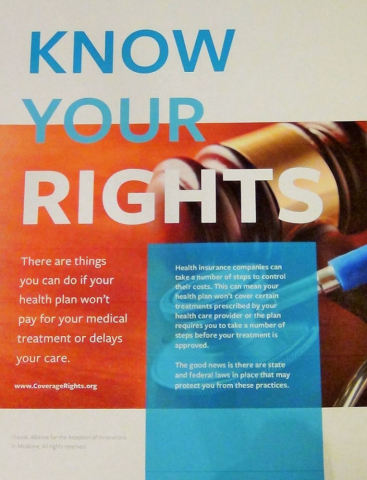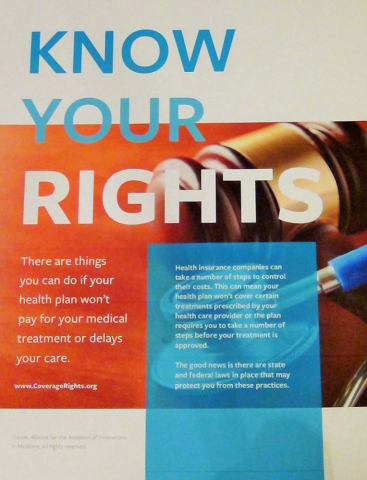WASHINGTON--(BUSINESS WIRE)--With mounting evidence that many Americans face high copays, coverage denials, and insurance practices that delay treatment or force patients to take less effective therapies, the Alliance for the Adoption of Innovations in Medicine (Aimed Alliance) – a non-profit organization working to increase access to evidence-based treatments and technologies – today announced a national campaign to help individuals understand their insurance coverage rights and equip them with information to challenge adverse benefit decisions based on potentially illegal practices by health plans.
Coming at a time when health plans’ denial rates routinely exceed 20 percent,1 Aimed Alliance launched Know Your Health Insurance Rights at www.CoverageRights.org. This new online tool identifies insurance practices that may violate federal and state consumer protection laws and walks consumers through the ways to challenge these practices in all 50 states. Know Your Health Insurance Rights explains how to file an appeal directly with the insurance company, request an outside review by an independent third party, and file a complaint with the insurance commissioner or attorney general in the consumer’s state.
Research shows that individuals are often successful when they appeal a denied health claim. A 2011 Government Accounting Office (GAO) report estimates that insurers reverse their adverse coverage decisions between 39 percent and 59 percent of the time when consumers appeal directly to the insurer and up to 54 percent of the time when consumers file a complaint with the state insurance commissioner.2 Yet many individuals are not aware of the steps they can take to appeal a denial.
“Even as most Americans pay higher monthly premiums for their health insurance than a year ago, many are not receiving the type of care they pay for and deserve,” said Stacey Worthy, Esq., Executive Director of the Aimed Alliance. “This is why we launched the Know Your Health Insurance Rights campaign – to provide a roadmap so consumers will have the know-how to successfully navigate the insurance appeals process.”
Identifying the Roadblocks
Often individuals are not aware of why they have lost access to treatment or prescribed medications. One of the priorities of the Know Your Health Insurance Rights campaign is to call attention to four common practices that insurers use to deny access to treatment or medications:
- Adverse tiering – a method used to discourage patients with certain conditions from enrolling in a health plan by placing newer drugs for diseases like cancer and HIV on the highest copayment tier. A 2015 study in The New England Journal of Medicine found that some insurers participating in the state health exchanges placed all HIV therapies on the highest tier, meaning enrollees in these plans paid more than twice as much for their drugs as those in other plans.
- Nonmedical switching – a practice where the health plan switches patients who are stable on a medication to a different treatment for nonmedical reasons by refusing to cover the therapy any longer or significantly increasing the copay. While insurers use this practice to control costs, patients may experience negative side effects of the new treatment regimen or become less responsive to treatment even if returned to their original medication.
- Prior authorization – a process requiring physicians and other health care providers to obtain advance approval from a health plan before a procedure, service, device, or medication is given to a patient and qualifies for payment coverage. Prior authorization can lead to delays in treatment. In a 2010 American Medical Association survey of 2,400 physicians, two-thirds reported waiting several days to receive authorization for drugs, while 10 percent waited more than a week.3
- Step therapy – a policy sometimes referred to as “fail first” that requires the individual to try one or more less expensive treatments first and “fail” on them before the health plan will cover the one prescribed by the provider. Step therapy not only delays effective treatment, but multiple studies show the practice increases the costs to the health care system, particularly for hospital and emergency-room care.
“These practices are not just onerous for patients. They interfere with the doctor-patient relationship, lead to unacceptable delays or changes in people’s treatment and may violate certain federal and state laws,” Ms. Worthy said. “Through the Know Your Health Insurance Rights resources, we hope to raise awareness around these methods, inform consumers of their rights, and help consumers navigate the appeals process to enhance access to their prescribed treatment.”
About The Alliance for the Adoption of Innovations in Medicine (Aimed Alliance)
Established in 2013 and based in Washington, DC, the Alliance for Adoption of Innovations in Medicine (Aimed Alliance) is a tax-exempt, not-for-profit organization that seeks to improve health care in the United States through access to evidence-based treatments and technologies. Aimed Alliance’s supporters are disclosed at http://www.aimedalliance.org/collaborators/.
1 Kaiser Health News. “Health Insurers Deny Coverage To Many
Who Apply For Individual Policies.” September 11, 2011.
2
Government accounting Office (GAO). Private Health Insurance: Data on
Application and Coverage Denials. March 2011.
3 American
Medical Association. Standardization of prior authorization process for
medical services white paper. June 2011.




